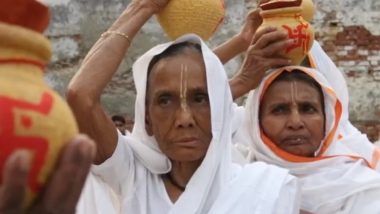Mathura (UP), Nov 4: The widows of Vrindavan Sunday gathered at the historic Gopinath temple, lit colourful earthen lamps, decorated intricate Rangolis and sang hymns as they celebrated a 'green Diwali' to fight against rising air pollution.
It was for the first time that the widows, some of them in their 90s and 100s, took part in the eco-friendly festivities at the 400-year-old temple in the holy city of Vrindavan, NGO Sulabh International, which takes care of around 900 widows living in different ashrams of Vrindavan said.
The pollution-free celebrations have come in the wake of the apex court's reference to the hazardous air pollution levels in Delhi-National Capital Region during and immediately after Diwali last year, the non-governmental organisation said.
"With an aim to bring a ray of happiness in their twilight years, we have come up with this unique idea to organise the festival of lights, especially for the widows," said social reformer and founder of Sulabh Movement Bindeshwar Pathak. This Janmashtami, Widows in Vrindavan Look Forward to Starting Life Afresh in New 'Home.'
This is the sixth year in a row that the event is being organised by the NGO, Pathak said, adding that the widows have defied age old traditions by celebrating not only Dipawali but Holi and Raksha Bandhan as well, besides taking part in Durga Puja celebrations in West Bengal.
On a routine basis, Sulabh provides them medical facilities and vocational training besides meeting their day-to-day needs, he said.
"Sulabh will continue with its nationwide campaign for welfare of widows,” he said further. Sulabh, known for promoting the concept of low-cost sanitation, started taking keen initiative in the welfare of widows, who lived in government shelter homes at Vrindavan, after the Supreme Court took strong exception to the manner in which their bodies were disposed of.
For the last six years, Sulabh has been providing Rs 2,000 as monthly assistance to each of the 900 widows living in five shelter homes in Vrindavan which too have been spruced up ahead of the festival of lights.
In places like Varanasi and Vrindavan, hundreds of widows lead an isolated life to attain moksha or liberation from the cycle of death and rebirth.
Living in small rooms in narrow alleys, they spend most of their time praying and looking for food, in absence of family support.













 Quickly
Quickly


